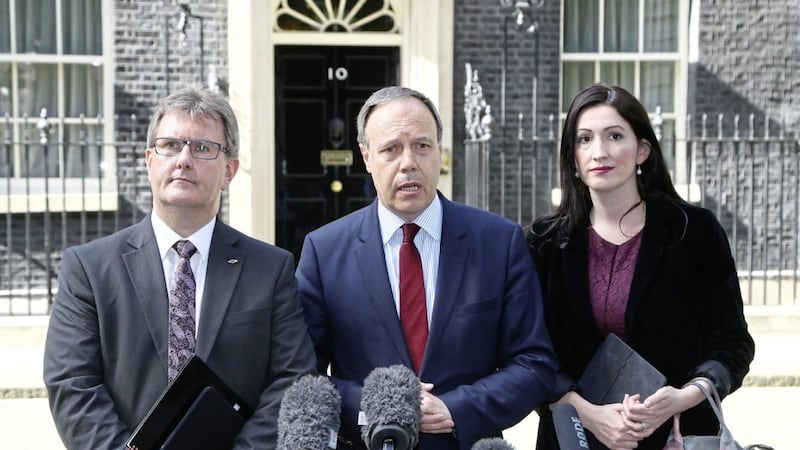“The focus has to be on Plan A, which is to get the institutions in place, that is our focus. We want into the institutions because that is what the people desire, that is what the people voted for. But also because we think, strategically, that is the way to a united Ireland. The way forward is not to be in a vacuum, to have stagnation; the way forward is to have that forum working on the basis on which it should have been established.”
That was Gerry Adams speaking on Tuesday. Yet, if you substituted ‘way to a united Ireland’ with ‘way to secure the Union,’ the rest of it could just as easily have been said by Arlene Foster. And therein lies the fundamental conundrum at the heart of the process: both sides quite like the institutions but want to deploy them for entirely different, mutually contradictory reasons. Which is why one crisis will continue to be followed by another: because agreement is not possible if the constitutional end game is different. The best we can hope for are political structures and key socio/economic decisions which deter militants, extremists, dissidents and terrorists from both sides.
Sinn Féin may also have a greater interest in rebooting the assembly/executive now that Foster and May have cut a deal at national level. Gerry Adams may not get terribly excited by the prospect of the DUP and SF having to work together, but he’d much prefer that to the alternative—the DUP and secretary of state making the decisions and dishing out the cash to their favoured projects and policies. And since the DUP/Tory deal could include an agreement not to reinstate full-throttled direct rule in the absence of a deal by June 29 (in other words, the institutions could be mothballed while the salaries continue), it suddenly becomes in SF’s interests to have an executive up and running.
Anyway, Foster’s hand is much stronger now than it was before the ballot boxes closed last Thursday. She doesn’t need the executive in place to guarantee political goodies for Northern Ireland—the sort of goodies that could prove very useful in the event of an early election to either the assembly or House of Commons. Adams, of course, would happily cut the same sort of deal if a post-election call came from either Leo Varadkar or Micheál Martin; but since that’s not happening anytime soon he will want to make sure that he has some sort of brake on Foster and the DUP.
The other thing which may make a difference to the ongoing talks here is the fact that I think both the DUP and SF would maybe find it easier to kick start the executive if the UUP, SDLP and maybe even Alliance (although both parties quite like Claire Sugden) could be brought on board. If nothing else it would remove that sense of them eyeballing each other across the table. And a multi-party executive is probably an easier sell at this moment—and against the background of a DUP/Tory deal—than just the DUP and SF.
Given the election results last week—and not forgetting the sheer expense involved in having to fight yet another election in which they’d probably take further hits—I think that both Robin Swann and Colum Eastwood would prefer the executive to opposition. Even one minister brings a massive amount of profile, as well as saving them the bother of having to construct their own programme for government and appointing a team of opposition spokesmen to deconstruct executive policy. At this stage the executive will look like a much more comfortable place for two parties which have taken such a hammering from the electorate.
So yes, it looks like there’s more likelihood of an executive now than there was this time last week. Foster’s position has been strengthened by the mere fact that she and the DUP will now be in a position to deliver without an executive. More than that, if there is another assembly election then it looks likely that the DUP will get the three extra MLAs they need to take them over the crucial 30 seats, as well as building on the 1,168 vote gap since March. Also, if James Brokenshire stops short of formal direct rule her MLAs and their staff won’t take a hit after June 29.
Sinn Féin may have been willing to let the assembly/executive swing in the wind or put them in deep freeze for a while. That option is not quite so attractive right now, because right now the DUP can thrive in a supposed vacuum. I’m also of the view that Foster could give the nod of approval to an ‘outsider’ to chair the talks: she has nothing to lose because her party still retains a veto on what happens. All of which brings us back to the key question: is Foster as first minister still a step too far for SF? If not, then everything else is possible, because the DUP is now strong enough to be magnanimous.








